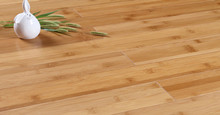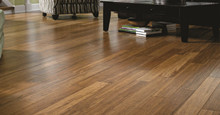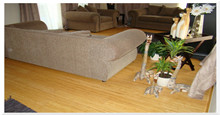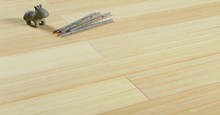Durability: This wood is naturally resistant to rot, decay, and insect infestations, making it ideal for outdoor use.
Weather Resistance: African Teak can withstand exposure to extreme weather conditions, including sun, rain, and humidity.
Low Maintenance: While every wood benefits from periodic oiling, African Teak requires less maintenance than some other hardwoods.
Sustainability: African Teak is harvested from well-managed forests, making it a more sustainable option compared to other tropical hardwoods.
Why Choose African Teak for Decking?
If you‘re looking for a premium hardwood with excellent durability and a beautiful finish, African Teak is a top contender. It’s a long-lasting material that can withstand harsh outdoor environments without losing its luster. The wood’s rich color darkens over time, creating a warm, inviting ambiance for any deck.
2. Yellow Balau (Bangkirai)
Scientific Name: Shorea laevis
Origin: Southeast Asia (Indonesia, Malaysia, the Philippines)
Color: Golden-brown to reddish-brown
Durability: Very high
Yellow Balau, also known as Bangkirai, is a dense and heavy hardwood that is widely used in decking in Southeast Asia and beyond. It’s known for its hardness, durability, and resistance to both decay and insects, making it an ideal choice for heavy-traffic areas.
Characteristics of Yellow Balau
Density: One of the densest hardwoods available, Yellow Balau offers excellent resistance to wear and tear.
Durability: Its natural oils help protect the wood from decay, mold, and insect damage.
Color: The wood boasts a rich golden-brown color that may darken slightly over time.
Texture and Grain: Yellow Balau has a fine and even texture with interlocking grain, giving it a visually striking appearance.
Why Choose Yellow Balau for Decking?
Yellow Balau is ideal for those looking to build a durable, long-lasting deck. Its high density makes it resistant to dents and scratches, which is especially important for areas with heavy foot traffic. Although it can be a bit more challenging to work with due to its hardness, the payoff is a deck that will last for decades.
3. Indonesian Merbau
Scientific Name: Intsia bijuga
Origin: Southeast Asia and the Pacific Islands
Color: Reddish-brown with gold flecks
Durability: High
Merbau is a highly sought-after hardwood in the decking industry, particularly in tropical regions. Its distinctive reddish-brown color, interspersed with golden flecks, makes it one of the most visually appealing decking materials available.
Characteristics of Indonesian Merbau
Durability: Merbau is naturally resistant to rot, decay, and termites, making it an excellent choice for outdoor applications.
Coloring: Its unique reddish-brown color, combined with golden flecks, adds a touch of luxury and warmth to any deck.
Density: Merbau is a dense hardwood that resists warping and shrinking when exposed to moisture.
Tannins: One drawback of Merbau is the presence of tannins, which can cause staining if not properly sealed.
Why Choose Indonesian Merbau for Decking?
If aesthetics are high on your priority list, Indonesian Merbau is hard to beat. Its rich color and grain pattern create a visually stunning deck that feels luxurious and timeless. However, keep in mind the potential for tannin bleed, which can be mitigated with proper sealing.
4. Brazilian Teak (Cumaru)
Scientific Name: Dipteryx odorata
Origin: South America (Brazil, Colombia, Peru)
Color: Light to dark brown, sometimes with reddish or yellowish hues
Durability: Very high
Brazilian Teak, also known as Cumaru, is an extremely dense and durable hardwood that is often compared to Ipe. It’s resistant to rot, decay, and insect attacks, making it a popular choice for decking in tropical and temperate regions alike.
Characteristics of Brazilian Teak
Hardness: Cumaru is one of the hardest woods available, making it excellent for high-traffic areas.
Durability: Its natural resistance to decay and pests ensures that your deck will stand the test of time.
Color Variation: Brazilian Teak offers a wide range of colors, from light to dark brown, with occasional reddish or yellowish streaks.
Density: Due to its density, Brazilian Teak can be more difficult to work with, requiring pre-drilling and specialized tools.
Why Choose Brazilian Teak for Decking?
If you’re looking for one of the most durable and long-lasting decking materials, Brazilian Teak is a fantastic option. Its hardness and natural resistance to the elements make it suitable for even the most demanding environments. Although it may be harder to work with, the result is a deck that will last for decades with minimal maintenance.
5. Cumaru Hardwood
Scientific Name: Dipteryx odorata
Origin: South America
Color: Various shades of brown with a reddish tint
Durability: Extremely high
Cumaru, also known as Brazilian Teak, is one of the hardest and most durable hardwoods in the world. It’s often used interchangeably with Brazilian Teak due to its similar properties. Cumaru is highly resistant to insects, decay, and weathering, making it an excellent choice for outdoor decking.
Characteristics of Cumaru
Density: Cumaru is incredibly dense, which contributes to its outstanding durability.
Durability: Its natural resistance to rot, insects, and moisture ensures longevity, even in harsh climates.
Coloration: Cumaru comes in a variety of shades, from golden-brown to darker reddish hues.
Hardness: Due to its hardness, Cumaru can be challenging to cut and install, but the payoff is a deck that will last a lifetime.
Why Choose Cumaru for Decking?
If you’re looking for a hardwood that can withstand the test of time, Cumaru is an excellent choice. Its durability, density, and resistance to insects and moisture make it one of the best hardwoods for outdoor decking. While it may require specialized tools for installation, it’s a worthwhile investment for a long-lasting deck.
Conclusion: Choosing the Right Hardwood for Your Deck
When it comes to decking, the choice of material is one of the most critical decisions you’ll make. All five hardwoods discussed in this guide—African Teak, Yellow Balau, Indonesian Merbau, Brazilian Teak, and Cumaru—offer exceptional durability, resistance to the elements, and stunning aesthetics. However, each wood has its own unique characteristics, so your decision should align with your specific needs, preferences, and budget.
African Teak offers a sustainable and luxurious option with a beautiful golden-brown hue.
Yellow Balau is perfect for those seeking a dense, durable, and affordable hardwood.
Indonesian Merbau stands out for its rich reddish-brown color and luxurious finish, though it requires careful sealing.
Brazilian Teak (Cumaru) provides unparalleled durability and a wide range of colors, though it can be more difficult to work with.
Cumaru is a fantastic choice for those interested in durability and long-term performance, especially in high-traffic areas.
Ultimately, you can’t go wrong with any of these hardwoods. Whether you prioritize aesthetics, longevity, or sustainability, one of these premium hardwoods is sure to meet your decking needs, offering a beautiful and functional outdoor space that you’ll enjoy for years to come.
Pro Tip: Regardless of the hardwood you choose, regular maintenance—such as cleaning, sealing, and oiling—can extend the lifespan of your deck, keeping it looking great for decades.



